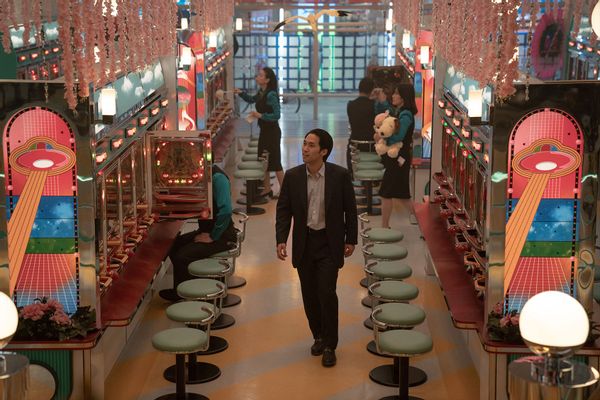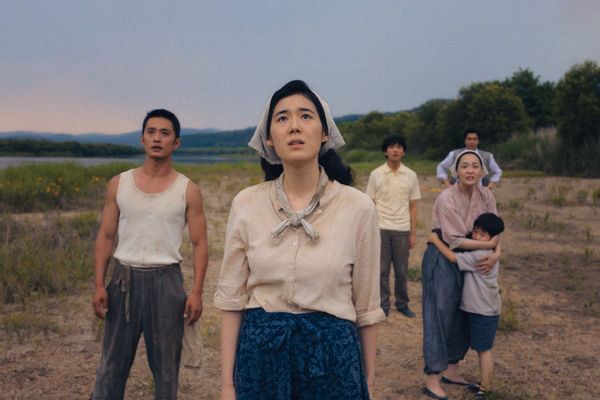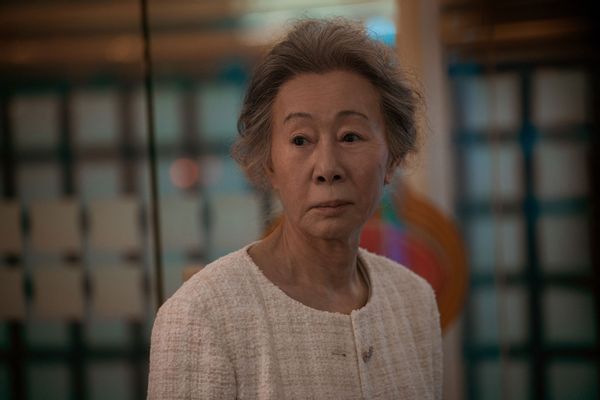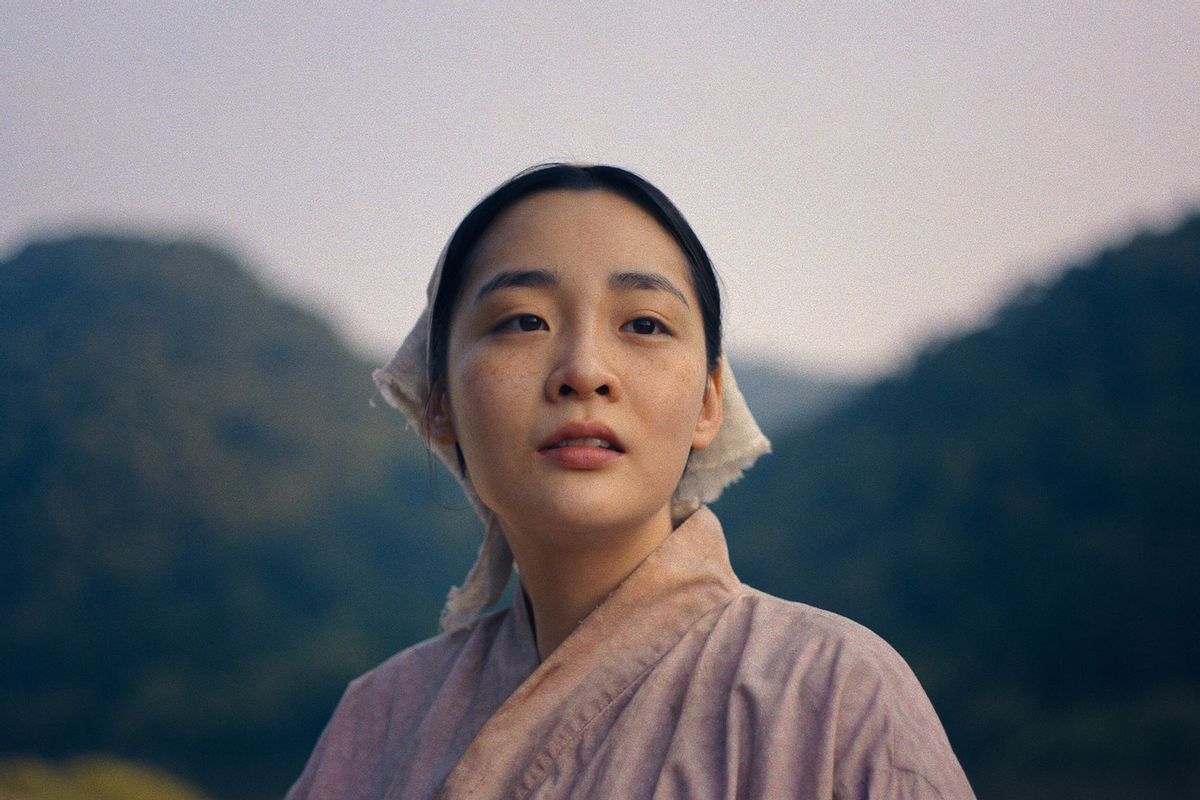Late in Season 2 of “Pachinko” waits a frame that’s as flawless as it is simple, in that it holds two people. By then we’ve watched their yearning for each other sigh and strain through several episodes leading up to that perfect picture capturing them as they finally face what they know to be true and yet, cannot be. The pair stands inches apart but the lighting, airy atmosphere and the weight of their suppressed affection turn that length into miles of impossibility.
Such bubbles of longing buoy most love stories, although they’re employed as sparing oases between expositional expanses. Soo Hugh’s adaptation of Min Jin Lee’s exquisite novel refuses to be so stingy, following the lead of her heroine Sunja Baek. Seen as a both 30-something mother in 1945 (Minha Kim ) and a revered elder in 1989 ( Yuh-jung Youn), Sunja’s wealth is her resolve, and Hugh uses her story as the thread connecting the lives and loves around her like precious beads.
 Pachinko (Apple TV+)
Pachinko (Apple TV+)
“Pachinko” is unrivaled on the small screen for its visual richness, the yield of what would otherwise be a modest setting. A story told in parallel timelines, it steps between the past and present seamlessly and without explaining itself. Gently and assuredly we understand the way choices seeded in the past wind their tendrils through the life of generations not yet born.
We can tell where we are in Sunja Baek’s life based on the featured cast, costumes and sets, but also through the difference in energy emanating from Kim’s expressive determination versus Youn’s more overt personality, which holds the ease of one who has seen much but lost none of her will.
Season 2 meets the younger Sunja in 1945, when she’s with her sons Noa and Mozasu on her own . . . although not entirely. Noa’s biological father Koh Hansu (Lee Minho) is the family’s shadow, determined to bind himself to Sunja and Noa’s fate by silently and jealously shaping it in the background regardless of what Sunja desires. When the Allies begin bombing Japan, Koh arranges their escape to a farm in the countryside to live safely if not entirely in peace.
In its simultaneously presented 1989 story, Youn’s Sunja and Mozasu (Soji Arai), now a successful owner of multiple pachinko parlors, witness her grandson Solomon (Jin Ha) struggle to recover all he’s lost after being ousted from his high-earning executive job. Solomon’s offense was to protect an elderly woman from selling her property to a predatory businessman, Abe (Yoshio Maki) who was pressuring her, and who salts the earth for the man who wronged him.
 Pachinko (Apple TV+)Quiet shows aren’t often afforded their due, something of which you may be constantly reminded while absorbing the care and detail that goes into each of “Pachinko’s” eight episodes. Its cinematography embraces the full palette of textures and tones, finding gorgeousness in the most common items — a box, a length of fabric, even a burnt-out ruin. In the early 20th century Sunja and her family contend with many of those. At times they can see the horizon burning where a sunrise or sunset would otherwise illuminate the sky.
Pachinko (Apple TV+)Quiet shows aren’t often afforded their due, something of which you may be constantly reminded while absorbing the care and detail that goes into each of “Pachinko’s” eight episodes. Its cinematography embraces the full palette of textures and tones, finding gorgeousness in the most common items — a box, a length of fabric, even a burnt-out ruin. In the early 20th century Sunja and her family contend with many of those. At times they can see the horizon burning where a sunrise or sunset would otherwise illuminate the sky.
But their countryside retreat is another kind of tinderbox. Sunja and her sister-in-law Kyunghee (Eunchae Jung) bear both the anxiety of being parted from their husbands and the vocal resentment of the native-born Japanese women who despise them for being Korean. Neither entirely know what to make of Koh’s man Mr. Kim (Sungkyu Kim), who remains with them under Koh’s orders.
This is a show that steeps us in the experience of living through history and demonstrates the vastness of ordinary lives and families like the Baeks, especially in the times when we know what lies in wait.
Quiet shows aren’t often afforded their due, something of which you may be constantly reminded while absorbing “Pachinko.”
When it’s mentioned that Yoseb, Kyunghee’s husband (Junwoo Han), has a factory job in Nagasaki, we know that is not the blessing the family believes it to be in such hard times. Another kind of cloud hangs over Solomon once he’s decides to mount an attack on Abe that he believe the powerful man won’t see coming. His grandmother senses the peril in Solomon’s overconfident business strategy, especially as he brushes off warnings that sound familiar from the other side of the Great Recession.
The magic of “Pachinko” doesn’t rest on its connection to historic benchmarks, although the episode depicting the hours and minutes leading up to the bombing of Nagasaki, half of it rendered in black and white, is a blunt-force knockout.
Like all else in the life and times of the Baeks, that’s a tragedy that happens to them; the story’s muscle is in what they do in its aftermath. In this, the writers find a bottomless trove of understanding for everyone, including Lee’s Koh who could easily press his taciturn flintiness in a sinister direction. At times he does. But his desire to be part of something honest and good overwhelms the shadiness in his personality owing to Lee’s uncomplicated performance.
 Pachinko (Apple TV+)
Pachinko (Apple TV+)
Koh’s arc and that of Mr. Kim are the most absorbing among the secondary figures, although not everyone is developed as richly. Anna Sawai reprises her role as Solomon’s now-former co-worker Naomi, and in the wake of her extensive and formidable presence in “Shōgun,” you may be disappointed with how little she has to work with.
A similar nagging accompanies Minha Kim’s performance this season which, though still moving in its subtlety does not lay many additional planks on whatever bridge eventually joins her rendition of Sunja and Youn’s. Her grandmotherly Sunja wears an unbothered determination fiercely throughout the season, especially when a shameful insult to which she’s subjected gives rise to an unexpected friendship that’s both affirming and potentially renewing.
Want a daily wrap-up of all the news and commentary Salon has to offer? Subscribe to our morning newsletter, Crash Course.
Even that is not entirely immune to the danger of the past rolling into the present, as we’re reminded scene by scene. Several characters repeat some version of the phrase, “always look forward,” which is fortifying but also unrealistic. The writers prove this many times over by having the ramifications of past decisions sneak up from behind to shove an unsuspecting figure with a schoolyard bully’s remorseless force.
More often in this darker span, “Pachinko” emphasizes how all histories matter, both the common and the personal, regardless of who is living them and how. Sunja sees this in her children and their potential to move her legacy beyond what she could imagine.
“Your grandfather always said he wanted me to fly high so I could see just how big this world is,” she tells one of her sons. “But can you promise me something? Every so often, you come back and tell me. I want to know as well just how big it is.” By returning to us, “Pachinko” gives us more of a sense of that immensity in ways we previously may not have thought possible.
“Pachinko” streams weekly starting Friday, Aug. 23 on Apple TV+.
Read more
about this topic

